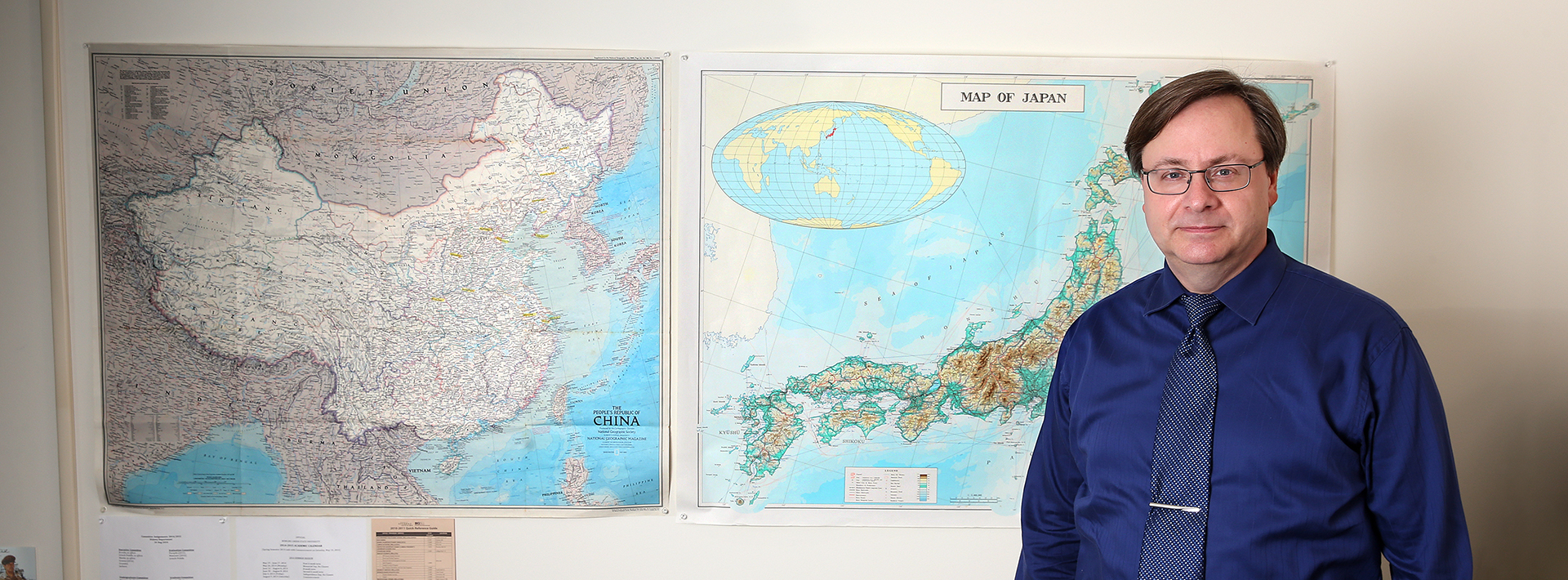Chemical weapons
Grunden invited to international conference

Of all the weapons of war, toxic chemicals are in some ways the most frightening and the least well known among the general public in the United States, said Dr. Walter Grunden, a history faculty member and expert on military history. From mustard gas to napalm to Agent Orange, many countries have used them at some point or are still using them, and there remains a disturbing number of them still sitting in storage today.
Grunden was invited to present a paper on Japan's use of chemical weapons against the Chinese in World War II at the recent international conference commemorating the 100th anniversary of the use of chemical warfare in Ypres, Belgium, during World War I. Held at the Max Planck Institute in Berlin, it was co-sponsored by the Fritz Haber Institute, where the first modern chemical weapons were developed.
The presentations examined chemical warfare around the world since Ypres, including the recent attacks in Syria. Panelists included Nobel Prize nominees (including Dr. Matthew Meselson of Harvard, who was the force behind the cessation of Agent Orange use in Vietnam), and some of the leading scholars on chemical warfare throughout the world.
“It was a real honor to be included among such distinguished scholars and experts,” Grunden said. Along with presentations on the historical and present-day use of chemical weapons, participants also heard from Paul Walker of the Green Cross, an international nongovernmental agency working to rid the world of chemical weaponry, whether its production sites or those being warehoused.
“While the use at Ypres may be an event that few Americans may recognize as significant today, it is still very important and relevant in Europe,” Grunden said. “One wonders how many Americans had a grandfather or great-grandfather affected by chemical weapons in WW I and do not even know it now.”
A specialist in policy history, Grunden presented “No Retaliation in Kind: Japanese Chemical Weapons Policy in China and the Pacific.” He examined interviews related to the Tokyo Trials of General Hideki Tojo and two other generals who had authorized widespread use primarily of “sneezing gas” similar to tear gas, plus mustard and other gases in Japan’s battles against the Chinese when the Chinese outnumbered or were beating them.
“In some cases the Chinese soldiers died,” Grunden said, “because they either lacked the proper training or the combat discipline to use gas masks, if they had them, or the masks were simply worthless. When they were attacked with poison gas, some stuck their faces in the mud and suffocated.
“The stated policy on the use of chemical weapons was one thing, but in the field it was something different. Why were these weapons used so often against the Chinese and not in Japan’s battles against the Americans, the British and the Australians in the Pacific Theater?” he asked. “Because they knew the Chinese could not retaliate in kind in the field. But they feared massive retaliation from the others.”
The history of the use of chemical weapons is complicated and fraught with misunderstanding and abuse, Grunden said. In Ypres, despite the fact that these weapons’ use had been illegal since the late 19th century, the Germans used chlorine gas that they let waft from thousands of cylinders, technically not illegal since it was not delivered by a carrier such as a mortar shell.
“But with that, the genie was out of the bottle,” Grunden said.
From mustard gas, a blistering agent that permanently damages the lungs when inhaled and blisters the skin on contact, to napalm and Agent Orange, chemicals have been used to control battles and populations, Grunden said. Although we tend to associate napalm with Vietnam, “we crossed that threshold long ago. Britain’s Royal Air Force and we were dropping napalm on Germany in World War II,” he pointed out. Although not a poison gas, the terrifying incendiary bombs made of jellied gasoline were another form of chemical weapon as well.
With all chemical warfare, as with atomic weapons, civilian lives are inevitably lost, Grunden said. “There is no merciful way to deploy that kind of weapon.” And had the U.S. not dropped the bombs on Hiroshima and Nagasaki, it was preparing to deploy poison gas on a large scale should an invasion prove necessary, he said.
“There’s hardly been a decade over the last 100 years that the United States hasn’t been at war somewhere,” Grunden said, adding that these issues are still very much alive and of concern today.
The conference proceedings will be used to produce a book, to which Grunden will contribute a chapter. “It’s very important to teach military history,” he said. “These are issues that need to be studied, discussed and debated.”
Updated: 12/02/2017 12:46AM
